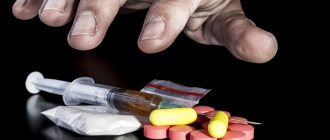One of the most common categories of crimes in Russia are drug-related criminal acts. In most cases, we are talking about the sale of narcotic substances. The practice of our lawyers in Moscow and Zheleznodorozhny shows that even if a person is detained and drugs are confiscated from him, he will most likely be accused not of possession or use, but under a more serious charge - for attempted illegal sale of drugs.
That is why the timely appearance of an experienced criminal lawyer in the case will help to avoid criminal punishment or significantly reduce it.
Distinction between completed and unfinished sales, difference from related crimes
The work of a lawyer when accusing a client of selling drugs should first of all be based on determining the position being defended:
- not guilty;
- guilty, but not of trafficking.
If the second option is chosen, then the defense must offer its version of events and its qualifications.
| Act | Content | Punishment |
| sale of narcotic drugs | activities that are aimed at transferring drugs to another person for money or free of charge (and this can be not only direct transfer, but also communication of the place where the substance is stored, injection) does not matter whether the recipient has acquired access to drugs | according to Part 1 of Art. 228.1 of the Criminal Code of the Russian Federation from 4 to 8 years of imprisonment |
| attempted drug trafficking | storage, production, acquisition of prohibited substances for the purpose of further sale (when it is established that the person intends to subsequently transfer drugs to other persons) | according to Part 3 of Art. 30 and part 1 art. 228.1 of the Criminal Code of the Russian Federation from 4 to 6 years of imprisonment |
| storage | possession of drugs, when a person keeps them on himself, in a hiding place, etc. and is not going to transfer them to anyone for free or for a fee + must be a significant amount | according to Part 1 of Art. 228 of the Criminal Code of the Russian Federation, a fine of up to 40 thousand rubles. (or income for 3 months) / community service up to 480 hours / correctional labor up to 2 years / restriction or imprisonment from 2 months to 3 years |
Thus, we see that in drugs, retraining can play a huge role. For attempting to sell drugs, the terms of imprisonment are many times greater than the punishment for established possession. Therefore, in the event of a loss in the first instance / in an appeal in this category of cases, it makes sense to hire a lawyer for a cassation appeal in a criminal case.
Attempted drug trafficking - defense against illegal charges
Narcotic drugs and psychotropic substances have become a real problem in modern Russia. But no less of a problem is the regular prosecution under criminal charges for drugs of persons who in fact do not pose an increased danger to society.
Articles on drugs, in terms of the severity of the punishment provided, can easily surpass such particularly serious articles against the person, such as murder or rape.
The problem begins with the lack of clear criteria for distinguishing between drug possession (Article 228 of the Criminal Code of the Russian Federation) and actions aimed at selling drugs (Article 228.1 of the Criminal Code of the Russian Federation). And this is provided that the difference in punishment under these articles is, to put it mildly, noticeable.
For a clear example, let’s take the most common situation in which a large amount of a narcotic drug is seized from a citizen, which the citizen kept for his own use (Part 2 of Article 228 of the Criminal Code of the Russian Federation).
Such crimes can be dealt with both by internal affairs bodies, for example, investigative departments at district police departments, and by specialized investigative units. Previously, these included the now defunct State Drug Control Service, whose employees became part of the investigative bodies in the Ministry of Internal Affairs.
The subject of proof under the article for drug possession is quite simple. The charges under Part 2 of Article 228 of the Criminal Code of the Russian Federation are based on the following standard documents:
-administrative protocol of a personal search or the results of an operational-search activity - a test purchase or an investigative experiment;
- protocols of interrogation of law enforcement officers, as well as witnesses present during the procedure for the seizure of prohibited substances;
- conclusion of a chemical forensic examination, issued on the basis of a preliminary certificate of examination of seized substances, which establishes the presence of narcotic drugs in the composition of these substances.
This, in principle, is the main “evidential backbone” of such an accusation.
If the fact of drug seizure is properly documented, it makes no sense for the accused to deny the accusation. The most optimal way out of such a situation in most cases is to plead guilty to illegal possession of drugs and file a petition for a special trial procedure.
The result is something like this. Punishment under Part 2 of Art. 228 of the Criminal Code of the Russian Federation ranges from three to ten years in prison. Consideration of the case in a special manner is guaranteed to reduce the upper limit of punishment from ten to six years and 6 months of imprisonment.
If the defendant is brought to criminal responsibility for the first time, has admitted his guilt and repented of his crime, has a positive character at his place of residence, work and (or) study, there is a high probability that the court will assign him the minimum possible sentence of three to three and a half years in prison. At the same time, in many cases, the court decides to consider the imposed punishment suspended, that is, it does not apply a punishment in the form of actual imprisonment to the convicted person. This is a “favorable” outcome in the case for a person who kept drugs on him for his own use.
In general, this arrangement is beneficial for all participants in the criminal process:
- for the investigation - because the accused admits his guilt, which means that his actions are qualified correctly, and the criminal case will easily stand up in court;
- judges - since when considering a case in a special manner, there is no need to examine the evidence presented (call and question witnesses, study the case materials), and the consideration of the case takes only one or two days of court hearings instead of several months of trial (hence the possible minimum sentences in case of good mood of the judge);
-lawyers - because they don’t need to work a lot in court, it is enough to limit themselves to presenting materials that positively characterize the personality of the client, and ultimately get a good result in the case; and, most importantly, for the accused himself, because he has a good chance of remaining free instead of going to prison for a long time.
But what then is the difference between illegal possession of drugs and attempted trafficking?
This is where the fun begins. In contrast to Part 2 of Article 228 of the Criminal Code of the Russian Federation, Article 228.1. The Criminal Code of the Russian Federation, in the case of completed sale of a narcotic drug on a large scale, provides for punishment in the form of imprisonment for a term (attention!) from ten to twenty years.
If we are not talking about the sale itself, but only about an attempt - when a person took the necessary preparatory actions in order to sell the drug (sell, donate, exchange - the method of alienation does not matter), but the crime was not completed due to circumstances beyond his control circumstances (for example, due to his detention), then in this case the punishment cannot exceed three quarters of the maximum term under this article and will range from ten to fifteen years in prison.
Thus, this article, in contrast to ordinary storage, belongs to the category of especially serious crimes, which, of course, increases the level of detection by law enforcement agencies. It is not difficult to guess that attempted trafficking is in greatest demand among investigative authorities, since the size of the punishment under this article is truly impressive.
But how to prove the fact that a person intended to sell narcotic drugs or psychotropic substances stored in his possession?
First of all, it is necessary to prove that the accused had intent to commit this crime, namely that the accused actually planned to transfer prohibited substances to third parties.
The accused himself can inform the investigator of the presence of such intent in his testimony if he does not navigate the current legal situation, that is, he himself “prescribes” ten to fifteen years in prison.
If the accused confesses to attempted trafficking, he will make a real gift to the investigator, since the investigating authorities will no longer need to prove anything in the case. The list of evidence will be similar to the evidence used in a possession charge (see above).
But what should the investigation do if the accused refuses? In this case, the investigative authorities have worked out a simple and, at first glance, impeccable scheme of action, which consists in the fact that the investigation pays close attention to the size of the seized substances and begins to evaluate it approximately as follows: “this size for one’s own use is too much.” a lot, which means the defendant clearly planned to sell these substances to someone else.” This is a simple explanation of the need to sentence a citizen to ten years in prison.
I cannot say that such an explanation is legitimate, because it is not.
The judicial practice of the Supreme Court of the Russian Federation proceeds from the fact that in itself a large volume of seized narcotic drugs or psychotropic substances, as well as their packaging, in the absence of other evidence in the case, cannot indicate the presence of intent on the part of the accused to illegally sell, and therefore be the basis for qualifying his actions under Article 228.1. Criminal Code of the Russian Federation.
But the preliminary investigation authorities stubbornly ignore the judicial acts of the Supreme Court of the Russian Federation, issued at the stage of appealing sentences in various criminal cases, and everywhere “paint” an attempt on illegal sales where it cannot exist in principle.
The situation has been aggravated by the fact that currently the investigative authorities and judges do not use qualifications for preparing for the illegal sale of drugs at all (in this case, the punishment under the article for sale is no more than ten years), but only charge with attempt.
Unfortunately, this happened because the Supreme Court of the Russian Federation eventually followed the lead of the now deceased state drug control and on June 30, 2015 introduced significant changes to the Resolution of its own Plenum of June 15, 2006 No. 14 on drug cases, according to which At this point, such a stage of committing a crime as preparation for the illegal sale of narcotic drugs and psychotropic substances actually ceased to exist. In any case, this is how these clarifications are universally interpreted by lower courts.
Naturally, such explanations are illegal and contradict the general provisions of the Criminal Code of the Russian Federation, according to which the preparation stage is possible in relation to any serious and especially serious crime, and there is an exception for Article 228.1. The Criminal Code of the Russian Federation is not provided for. But this nuance interests absolutely no judges or law enforcement agencies.
The position of the accused and his defense attorney in the event of an illegal and unfounded accusation of attempted drug trafficking must be clear and based on the following:
- the accused had no intent for illegal sale, he kept the seized drugs for his own use (it’s not bad if the fact of use is established during the investigation, for example, in the medical examination report and (or) in the testimony of witnesses);
-the accused has never previously been involved in the sale of narcotic drugs and psychotropic substances (this may be evidenced by the absence of any operational materials in relation to the accused in the criminal case);
- in the materials of the criminal case there is no evidence that the accused had an intent to sell (this is in the case of a standard set of evidence related only to the very fact of drug seizure, which the accused himself does not deny);
- the large size of the seized narcotic drugs or psychotropic substances does not indicate that the accused had an intent to illegally sell them, since it is not his fault that the seller gave them to him in this form, or, alternatively, the accused planned to purchase a significant amount of prohibited substances at one time in order to do not risk being prosecuted each time.
If you need professional defense in a criminal case related to illegal trafficking of narcotic drugs, psychotropic, toxic and potent substances, call us at: +7(926)254-36-86.
Sincerely,
lawyer V.Yu. Bondarchuk.
Legislation in the Russian Federation is changing rapidly, so the information in this article may have lost its relevance. To get an answer to your question, use an online consultant or call a lawyer at: +7(926)254-36-86.
Similar articles:
Who will the children stay with after the divorce?
How to force a child's father to pay child support
Receiving a bribe - Art. 290 of the Criminal Code of the Russian Federation. Defense tactics.
How to behave during a search in an apartment
Attempted illegal sale of narcotic drugs: how to mitigate the punishment
Attempted sale of drugs, as well as completed sale, is a very serious crime. If there are no options to “jump” from this composition (re-qualify), then it makes sense to turn to mitigating circumstances. The judge will take them into account when assigning punishment and, at a minimum, assign a shorter term of imprisonment.
What circumstances mitigate guilt? For example, the presence of small children, attempted trafficking as a result of coercion or due to difficult living conditions, pregnancy, etc. And for such a mitigating circumstance as surrender, the Criminal Code of the Russian Federation prohibits the imposition of more than 5 years and 4 months for attempted trafficking. imprisonment.
In some cases, the assistance of a professional lawyer can also ensure a suspended sentence without serving a sentence.
Unfortunately, the reality of Russian justice is such that not only the prosecutor, but also the investigator, and even the court are on the side of the prosecution. A very good criminal lawyer will help the accused to withstand this unequal confrontation. His work consists of both developing and presenting a position on the case, writing a lawyer’s appeal or cassation complaint against the court verdict, and responding to any arbitrariness on the part of the authorities in the form of comments, petitions and restoring the violated rights of the client.
Criminal lawyer.
On July 30, 2022, police officers detained gr. D. on suspicion of committing a crime under Part 3 of Art. 30, paragraph “g”, part 4, art. 228.1 of the Criminal Code of the Russian Federation - attempted illegal sale of narcotic drugs, committed on a large scale.
During a search of the suspect's home, drugs were seized: hashish weighing 24.749 grams, hashish weighing 0.352 grams, and the narcotic substance methamphetamine weighing 0.151 grams. Electronic scales, polymer bags for packaging drugs, and a “bong” drug device were also seized. The suspect admitted his guilt and explained that he kept drugs both for personal consumption and for sale.
Having accepted the defense of gr. D., taking into account his confession, a defense tactic was chosen aimed at reclassifying the criminal act to a milder one, proving the intent of the perpetrator to sell narcotic drugs in a significant amount, and not in large quantities - as charged.
At the preliminary investigation stage, the investigator refused to reclassify the charges against the defense, continuing to prove that all the drugs seized from the accused’s house were intended for sale. The request to the prosecutor was also unsuccessful.
At the court hearing, the state prosecutor asked to recognize gr. D. Vinnov of committing a crime under Part 3 of Art. 30, paragraph “g”, part 4, art. 228.1 of the Criminal Code of the Russian Federation, and sentence him to imprisonment for a term of 9 years 6 months.
By presenting evidence in court and arguing my position in the debate, I was able to prove that only 24.749 grams were intended for sale. hashish, and the rest of the drugs were kept by gr. D. for personal consumption.
In accordance with the Decree of the Government of the Russian Federation dated October 1, 2012 No. 1002 (as amended on March 13, 2020) “On approval of significant, large and especially large sizes of narcotic drugs and psychotropic substances, as well as significant, large and especially large sizes for plants containing narcotic drugs drugs or psychotropic substances, or parts thereof containing narcotic drugs or psychotropic substances, for the purposes of Articles 228, 228.1, 229 and 229.1 of the Criminal Code of the Russian Federation,” the mass of hashish of 24.749 grams is a significant size, which entails reclassification of a criminal act.
On May 15, 2022, when passing a verdict, the court listened to the arguments of the defense and reclassified the act of gr. D. for part 3 of Art. 30, paragraph “b”, part 3, art. 228.1 of the Criminal Code of the Russian Federation - attempted illegal sale of narcotic drugs in a significant amount, assigning gr. D. punishment in the form of imprisonment for a term of 6 years 6 months without imposition of additional punishment.
(Sentence of the Oktyabrsky District Court of Novosibirsk in case No. 1-144/2020).
Everything about criminal cases
Sales is transfer by any meansUrl Additional information:
— clause 13
Plenum No. 14 sales is a sale to another, including free of charge
- sales is transfer
drugs in any possible way (for the list of methods, see
paragraph 13
of Plenum No. 14).
The motive doesn't matter
(for qualification)
- sales is transfer
drugs to another person for
any
motive, including selfless, not just sale (
clause 13
of Plenum No. 14).
- for example, even a simple treat of a narcotic substance will be considered sales. That is, simply by giving a drug to a person, he can easily jump over administrative article 6.8 of the Code of
to article
part 1 228.1 of the Criminal Code
.
For punishment, the motive is taken into account
- it should be understood that the motive is not important for the formal qualification of an action as “sales”. But the type of motive must still be taken into account for punishment purposes.
Url Additional information:
- part 1 64 of the Criminal Code
taking into account goals and motives for reducing punishment
- for example, it may affect the application of Article 64 of the Criminal Code
(the imposition of punishment is lower than the sanction of the article).
FINALITY of sales (error)
When checking the sentence for drug trafficking, pay attention to whether there is the following error.
Error: when the court qualifies the sale as a completed crime, when in fact there is no completed crime there.
When the sale is considered completed
?
Completeness of all actions for delivery
Url Additional information:
— clause 13.1
Plenum No. 14 sales ended after transfer actions
In clause 13.1
Plenum No. 14, the Supreme Court gave the following instruction: the sale of drugs is considered completed from the moment when the offender has taken all actions
sufficient
to ensure that the drug reaches the buyer. But whether the drug reached the buyer no longer matters.
And this is where the courts sometimes make mistakes: pay attention to how the illustration below describes the drug sales scheme in the verdict. It happens (especially in group crimes) that the “last link” is not enough to complete the sale. Those. It is not indicated how the drug actually reached the purchaser. The bookmarks have been laid, but there is no description in the verdict about bringing them to the attention of the acquirer. The result of such an error: reclassification into an unfinished crime.
ILLUSTRATION (Appeal ruling of the Supreme Court dated 03/05/2019 N 16-АПУ19-2)
«the actions committed by the convicts, judging by the existing scheme, were insufficient for the sale of narcotic drugs, since this required the fulfillment of the most significant condition, such as bringing information about the location of hiding places to consumers
. However, in the verdict in terms of the description of the criminal act there is no indication of such a circumstance. In this situation, there is no basis for qualifying the crime committed by the convicted person as completed, and therefore the court incorrectly applied the criminal law, which requires elimination.
Reclassify the actions of the convicted person from a completed crime to Part 3 of 30 of the Criminal Code, Part 5 of 228.1 of the Criminal Code, and mitigate the punishment
«.
This illustration shows that the court did not notice that the last link was missing in the chain, without which the drug simply would not have reached the consumer.
Information to the accomplice (but not to the consumer)
It is important that if the “mortgagor” performed all the actions, but sent the information not to the consumer, but to an accomplice
- then this does not qualify as a completed crime.
ILLUSTRATION (clause 50 of the Review of Practice of the Supreme Court No. 3 (2021) Determination No. 25-UD21-6-K4)
«qualifying the actions of the convicted person for the sale as a completed crime, the court did not give a proper assessment to the fact that information about the location of caches with stashes of narcotic drugs in accordance with the agreement reached and the distribution of roles between the convicted person by an unknown person was not brought to the attention of potential purchasers by the specified unidentified person, which was directly supposed to inform them of this information, while the narcotic drugs themselves were seized from these hiding places by law enforcement officers
«.
ILLUSTRATION (Cassation ruling of the Supreme Court dated 03/09/2021 No. 41-UD20-55)
According to the RF Armed Forces, transferring information about stash locations to one’s partner in the sale does not indicate the commission of a completed crime. Indeed, as a result of these actions, this information did not become available to the purchaser of narcotic drugs. The actions of the convicted person were qualified by the Supreme Court as an attempted sale.
Co-execution in acquisition or sales?
Lawyer Antonov A.P.
To qualify the actions of an intermediary as complicity in the sale, it must be proven that he acted on the instructions or request of the owner of the drugs, and not just knew the path to the right place and the agreed knock on the door. According to the Resolution of the Plenum of the Armed Forces of the Russian Federation dated June 15, 2006 No. 14 (as amended on June 30, 2015): “in the case when a person transfers narcotic drugs to the purchaser ... at the request (instruction) of another person to whom they belong, his actions should be qualified as co-execution in the illegal sale of these funds, substances, plants.” The implication is that the opposite is true: if a person does not act at the request (instruction) of a drug seller, his actions should not be qualified as co-perpetrators in illegal sales. Although significant changes were made to the Resolution of the Plenum on Drug Cases in 2015, most of the legal positions on the distinction between assistance in acquisition and sales contained in the decisions of the Supreme Court adopted before 2015 remain relevant. The most revealing case is the Garanov case.
Resolution of the Presidium of the RF Armed Forces dated August 1, 2001 No. 488P01 states: “As can be seen from the case materials, O. recruited Garanov as an intermediary to purchase a small amount of the drug for himself, indicating that it was intended for personal consumption. By agreement with O. and together with him, Garanov fulfilled the objective side of the act, which provides for liability for the illegal acquisition and storage without the purpose of selling a narcotic drug on a large scale: for O.’s money and at his request, he bought heroin and gave it to him. Garanov’s intent included providing assistance to O. in purchasing heroin, and not its sale (distribution). In relation to the provisions of paragraph 2 of Art. 33 of the Criminal Code of the Russian Federation, Garanov’s direct participation in O.’s illegal acquisition of heroin is co-execution, and their actions, if O. is brought to criminal liability under Part 1 of Art. 228 of the Criminal Code of the Russian Federation, as provided for in Part 2 of Art. 34 of the Criminal Code of the Russian Federation, should have been qualified under one article of the Special Part of the Criminal Code of the Russian Federation.”
On similar grounds, the criminal prosecution of Lyzhin, convicted of complicity in the sale, was discontinued. The Supreme Court admitted that: “as can be seen from the case materials and the court established in the verdict, K., who carried out the test purchase of the narcotic drug, engaged Lyzhin as an intermediary for the purchase of the narcotic drug and for this purpose gave him money twice. It was with this money that Lyzhin purchased hashish (0.3 grams and 0.15 grams) from Popovich and handed it over to K. There is information that K. intended to sell the narcotic drug received through Lyzhin, and Lyzhin was aware of this, in the materials of this There is no criminal case and the court did not establish such circumstances in the verdict. Consequently, Lyzhin acted in the interests of the acquirer, K. His intention was only to assist K. in purchasing hashish for the latter’s money, and not to sell him the narcotic drug. Therefore, what Lyzhin did should be regarded as complicity in the illegal acquisition of a narcotic drug without the purpose of sale” (Supervisory ruling of the RF Armed Forces dated April 10, 2007 No. 5-D07-26 in the Lyzhin case)
More examples. “The evidence available in the case materials and examined at the court hearing indicates that at the moment when B. approached Ryzhov, he did not have a narcotic drug that he could sell. At the same time, the heroin bought by Ryzhov for B.’s money belonged to the latter, who took his property as the owner” (Determination of the RF Armed Forces of January 16, 2013 No. 50-D12-116 in the Ryzhov case). “The concept of “sale” means the sale of narcotic drugs (sale), therefore, in cases where the offender, at the request of another person and for his money, illegally acquires a narcotic drug, his actions do not constitute its sale, but complicity in its acquisition, regardless of the under what conditions does he do this and whether he receives remuneration for this” (Decision of the Supreme Court of the Russian Federation of June 2, 2010 in the Khaburzina case).
“The transfer of a narcotic drug to another person in itself is not a basis for qualifying the actions of the perpetrator as sale. According to the law, the sale of narcotic drugs means any method of transferring drugs to another person who does not own them. However, it is necessary to establish that the intent of the perpetrator was aimed specifically at the distribution of narcotic drugs” (Decision of the Supreme Court of the Russian Federation of September 13, 2012 in the Mikhailovsky case).
So far, recent practice (after 2015) has been found only at the level of courts of the constituent entities of the Russian Federation. This does not mean a change in the position of the RF Supreme Court on this issue, but is a consequence of a significant reduction in the number of complaints considered by the Supreme Court against sentences that have entered into legal force. If in 2003 the Supreme Court considered the merits of 19.3 thousand criminal cases based on what were then called supervisory complaints, then in 2017 only 9.3 thousand cases were considered. The decisions of regional courts indicate that the position of the Supreme Court on this topic has not changed. Thus, by the Resolution of the Presidium of the Moscow City Court dated August 31, 2018 in case No. 44u-473/2018 against Rozhkov, all charges under Article 228.1 were dropped, since: “there is no evidence confirming the court’s conclusion that, by transferring I. G. narcotic drug, Rozhkov V.A. acted with the aim of its implementation, the court of first instance did not include in the verdict.”
Sincerely, lawyer Anatoly Antonov, managing partner of the law firm Antonov and Partners.
Still have questions for your lawyer?
Ask them right now here, or call us by phone in Moscow +7 (499) 288-34-32 or in Samara +7 (846) 212-99-71 (24 hours a day), or come to our office for a consultation (by pre-registration)!
Can a suspended sentence be imposed for attempted sale under paragraph “g” of Part 4 of Art. 228.1 of the Criminal Code of the Russian Federation
Lawyer Ivlev Sergey Sergeevich
Call now and get a preliminary consultation:
8-912-351-26-42 8
From the content of the question asked, it follows that the authorities conducting the preliminary investigation are charging an attempted crime under paragraph “g” of Part 4 of Art. 228.1 of the Criminal Code of the Russian Federation of June 13, 1996 N 63-FZ (hereinafter referred to as the Criminal Code of the Russian Federation), namely, illegal production, sale or transfer of narcotic drugs, psychotropic substances or their analogues, as well as illegal sale or transfer of plants, containing narcotic drugs or psychotropic substances, or parts thereof containing narcotic drugs or psychotropic substances, committed on a large scale.
Punishment for this crime is provided in the form of imprisonment for a term of ten to twenty years with deprivation of the right to hold certain positions or engage in certain activities for a term of up to twenty years or without it and with a fine of up to one million rubles or in the amount of wages or other income of the convicted person for a period of up to five years or without it.
In accordance with Part 5 of Art. 15 of the Criminal Code of the Russian Federation, the specified corpus delicti belongs to the category of especially grave crimes (deliberate acts, the commission of which is punishable by imprisonment for a term of over ten years or a more severe punishment).
Within the meaning of Part 3 of Art. 66 of the Criminal Code of the Russian Federation, the term or amount of punishment for an attempted crime provided for in paragraph “d”, part 4 of Art. 228.1 of the Criminal Code of the Russian Federation cannot exceed three quarters of the maximum term or amount of the most severe type of punishment, that is, 15 years of imprisonment.
The presence of the circumstances you have listed (including confession, active assistance in solving and investigating the crime, exposing and prosecuting other accomplices in the crime, searching for property obtained as a result of the crime, certificates from neighbors, the local police officer, positively characterizing the defendant.), positive. Characteristics from the place of work according to the current criminal legislation refer to circumstances mitigating the punishment when it is assigned.
Within the meaning of Part 1 of Art. 73 of the Criminal Code of the Russian Federation, if, having imposed imprisonment for a term of up to eight years, the court comes to the conclusion that it is possible to correct the convicted person without actually serving the sentence, it decides to consider the imposed sentence suspended.
Due to the fact that the crime in question refers to especially serious crimes, the lower limit of the sanction is 10 years in prison, it is not possible to count on imposing a sentence without actually serving it (suspended).
Attention! The information provided in the article is current at the time of publication.
The lawyer achieved an acquittal on charges of illegal trafficking in potent substances
On November 9, the Izmailovsky District Court of Moscow issued a verdict against G., which acquitted him under Part 3 of Art. 234 of the Criminal Code of the Russian Federation for lack of corpus delicti, and also re-qualified his actions from Part 3 of Art. 30 and paragraph “g”, part 4, art. 228.1 for part 2 of Art. 228 CC. Lawyer of the Moscow AP Sharbatullo Sodikov, who defended the defendant, told AG about the circumstances of the case and how he managed to prove the defendant’s innocence of illegal trafficking in potent substances and achieve the reclassification of the act to a less serious one under the second offense (illicit trafficking in narcotic and psychotropic substances substances in significant and large quantities).
According to the investigation, G., having no legal sources of income and other legal means of livelihood, acting deliberately for selfish reasons with the aim of illegal enrichment, entered into a criminal conspiracy with an unidentified person aimed at the illegal acquisition, storage and transportation for the purpose of selling potent substances , which are not narcotic or psychotropic, on a large scale. On March 6, 2022, he received from an accomplice for the purpose of subsequent sale 460 capsules of 0.3 g containing pregabalin. In addition, implementing a criminal intent aimed at illegal storage without the purpose of selling narcotic drugs in a significant and large amount, on the same day he received from an unidentified person a substance with a total weight of 0.48 g containing amphetamine, and packages with narcotic substances (hashish and derivatives of N-methylephedrone).
As noted in the indictment, he placed these substances in the back seat of the car he was driving, and the amphetamine in the left pocket of his jeans. Soon G. was stopped and detained by police officers. Thus, the investigation concluded, G. and his unidentified accomplice were unable to complete the criminal intent aimed at the illegal sale of potent substances, due to circumstances beyond their control.
According to lawyer Sharbatullo Sodikov, events developed differently. On March 6, 2022, his client met a group of young people at a Moscow club, who, having learned that he was driving a car, asked after a joint vacation to give them a ride in the same direction. Later, G., using a car sharing service, began to take new acquaintances home. Subsequently, it turned out that one of the passengers had left a plastic bag under the back seat of the car, which G. did not pay attention to.
A few minutes later, the police stopped the car and during a search of the interior in the presence of witnesses, they found 4 packages made of foil and polyethylene on the front panel on the passenger seat side and seized them, 4 more packages were found under the seat, and in the back seat - a large garbage bag with food and drink cans containing 57 polyethylene packages. In addition, during a personal search of the detainee, a case containing a powdery substance weighing 0.48 g was found and seized in the pocket of his jeans. G. explained that it was amphetamine, which he uses for personal use.
On the same day, a criminal case was initiated against G. under Part 3 of Art. 234, as well as Part 3 of Art. 30 and paragraph “g”, part 4, art. 228.1 of the Criminal Code of the Russian Federation and a preventive measure was chosen in the form of detention.
According to the conclusion of a chemical forensic examination, the substances in the bundles and package were both narcotic drugs (hashish with a total weight of 8 g, as well as an N-methylephedrone derivative with a total weight of 35.87 g) and potent non-drug drugs (pregabalin with a total weight of 138 G). The experts also came to the conclusion that G. has a syndrome of dependence on several psychoactive substances.
“Throughout the entire proceedings in the case, my client took a consistent position and denied involvement in the distribution of substances prohibited from free circulation,” noted Sharbatullo Sodikov. “More than a dozen petitions and complaints from the defense were not satisfied, and the defense version was not verified. During the judicial investigation, my client confirmed his earlier testimony that he had never been involved in the sale of narcotic drugs.”
The defense lawyer added that the preliminary investigation authorities failed to achieve a quick consideration of the criminal case and conviction of the client, since the judges twice returned the case from the trial stage to the prosecutor's office in connection with violations of the Code of Criminal Procedure of the Russian Federation committed at the preliminary investigation stage.
At the court hearing, the defendant partially admitted his guilt: he explained that he has been using amphetamine since 2022, and also takes sedatives, but has never been involved in the sale of drugs. He insisted that the remaining drugs found in the car belonged to another person. He also added that he suggested to the police officers to detain the man who left a bag of drugs in the car, but they did not listen to him.
During the court hearing, the defense attorney recalled that the initiative in the sale of drugs always comes from the drug dealer, which must be confirmed by the testimony of the persons involved and other evidence. At the same time, in the initial telephone message from the traffic police officer to the police department on duty and in the initial testimony of the police officers, there was no information that G. allegedly purchased the specified substances for the purpose of subsequent sale.
In addition, no operational investigative measures were carried out against G. aimed at identifying crimes in this area (operational experiment, test purchase, wiretapping or surveillance), and no incriminating items were found on the items seized from him. his data - in particular, indicating connections with drug dealers or drug addicts. There is also no other evidence of his intent to sell the discovered mass of the substance. At the same time, the defense lawyer referred to the positions of the Supreme Court of the Russian Federation (clause 7 of the Plenum Resolution No. 14 of June 15, 2006 “On judicial practice in cases of crimes involving narcotic drugs, psychotropic, potent and toxic substances”, Determination of March 1, 2012 in case No. 69-D12-2) and the Moscow City Court (resolution of the Presidium dated April 12, 2012 in case No. 44у-125/12, ruling dated June 14, 2018 in case No. 10-5438/2018) on that the amount of a substance found and seized from a person cannot in itself indicate the latter’s intent to sell it, unless such intent is confirmed by a body of other evidence, which is not available in this criminal case.
Regarding the charges of illegal acquisition, storage, transportation for the purpose of selling potent substances that are not narcotic drugs or psychotropic substances, by a group of persons by prior conspiracy on a large scale, the court noted that, as seen from the examined evidence, information that the defendant was selling pregabalin , the case materials do not contain, as well as other factual, indisputable data confirming the facts of sales. G.'s testimony that he was not involved in the sale of potent substances was not refuted by the case materials. All this, as noted in the verdict (available to the “AG”), indicates that during the judicial investigation, G.’s accusation of committing the incriminated act was not confirmed due to the absence of a mandatory element of the crime - the purpose of distribution.
Having analyzed and assessed the evidence presented by the prosecution, the court came to the conclusion that there was no corpus delicti in the defendant’s actions under Part 3 of Art. 234 of the Criminal Code and acquitted him in this part with the right to rehabilitation.
On the second episode of the charge (part 3 of article 30 and paragraph “g” of part 4 of article 228.1 of the Criminal Code), the defense lawyer drew the attention of the court that, despite the signs of drug intoxication and traces of recent use being revealed in the defendant during a medical examination immediately after the arrest drugs, this only indicates his possession and use of prohibited substances, but does not provide grounds for charges of their sale. In this regard, according to the lawyer, the actions of the defendant are subject to qualification under Part 1 of Art. 228 of the Criminal Code as a crime of minor gravity.
Having assessed and examined the evidence in the case, the court did not agree with the qualification of the act under Part 3 of Art. 30 and paragraph “g”, part 4, art. 288.1 of the Criminal Code, noting that from the evidence examined by the court it is clear that G.’s detention by police officers was accidental; there is no information that he sells narcotic and psychotropic substances, as well as other indisputable data indicating sales. There is also no information that law enforcement officers had any preliminary information about the defendant’s involvement in the sale of prohibited substances.
From the conclusion of the outpatient forensic psychiatric examination it also follows that G. uses cannabinoids, and during a medical examination he was found to have amphetamine - that is, the same types of drugs and psychotropic substances that were seized during the inspection of the crime scene and the personal search of the defendant. “The specified circumstances, taking into account the provisions of Part 3 of Art. 14 of the Code of Criminal Procedure of the Russian Federation, according to which all doubts about the guilt of the accused, which cannot be eliminated in the manner established by the Code of Criminal Procedure of the Russian Federation, are interpreted in favor of the accused, indicate that during the judicial investigation G. was accused of attempted illegal sale of narcotic substances on a large scale size and psychotropic substances in a significant amount by a group of persons by prior conspiracy was not confirmed,” the verdict emphasizes.
Taking into account the above, the court qualified the actions of the accused under Part 2 of Art. 228 of the Criminal Code - as illegal possession without the purpose of selling narcotic drugs in a significant and large amount and psychotropic substances in a significant amount - and imposed a sentence of four years in a general regime colony. Based on Part 3.2 of Art. 72 of the Criminal Code, the time of keeping the convicted person in custody (from March 6, 2022 until the day the sentence entered into force) was counted towards the sentence on a daily basis.
“The charge against my client under Part 3 of Art. 30, paragraph “g”, part 4, art. 228.1 of the Criminal Code was also not confirmed by the materials of the criminal case during the trial, since throughout the entire proceedings, my client took a consistent position and denied his involvement in the distribution of narcotic drugs, and the investigation and the prosecutor’s office did not have any evidence incriminating him ", Sharbatullo Sodikov noted in a commentary to AG. He added that during the preliminary investigation, the alleged accomplices in the illegal trafficking of prohibited substances, the channels for their distribution to the accused and the probable purchasers were not identified and then proven in court.
“Despite this, the prosecutor’s office asked the court to sentence my client to 13 years in a maximum security colony. As a result, the court did not agree with the prosecution's arguments. The position of the defense, confirmed by the case materials, led to the fact that my client was acquitted of the charge of illegal sale of potent substances due to the lack of corpus delicti with the right to rehabilitation and compensation for harm caused by illegal criminal prosecution, and for the second, the act was reclassified as Part 2 Art. 228 of the Criminal Code,” the lawyer emphasized, adding that most of the sentence was paid off by crediting the time in custody.
According to the lawyer, the key argument of the defense was the testimony of an acquaintance of the defendant, who on the day when the crime accused of G. was committed was in the car with him and saw a passenger unknown to her, who could have left behind the package and packaging that was discovered and subsequently seized during inspection. with narcotic and potent substances, which was repeatedly pointed out by G. “However, this version was not verified by the investigation, no measures were taken to search for the unknown person. This means that the investigation’s conclusion that the defendant owned the entire mass of seized substances was based on an incomplete and one-sided investigation,” Sharbatullo Sodikov emphasized.
In conclusion, Sharbatullo Sodikov expressed gratitude to the court for ensuring a real adversarial process, but the point in this process, according to the defense lawyer, has not yet been set, since the prosecutor’s office intends to appeal the verdict.








